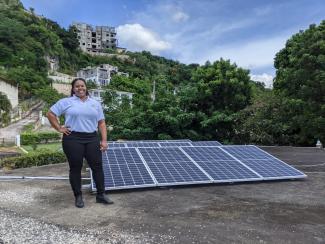How one Jamaican is renewing the minds of her fellow countrymen to conserve and preserve energy, one installation at a time.
Thirty two year old Zahra Ennis admits that she has gotten accustomed to the constant questions and concerns when she carries out specific duties of her job. Questions such as “Are you going to go on the roof?” “Do you not have anyone to help you?” “Are you sure you know what you are doing?”
As the Marketing Director for Saddle Energy Ltd, a small renewable energy company that specializes in solar installations, assessment and procurement of equipment, Zahra’s job goes beyond her official title and covers most of the company’s operations.
“My job will take me from administrative and sales to surveys and site visits,” explains Zahra.
A job that has increased her appetite to learn and grow more within the energy industry over the last two years.
Although she is fairly new to the energy sector, Zahra has a passion for finding ways to conserve and preserve the biodiversity within her country and, by extension, the planet. Through her studies in marine biology and conservation, it was easy for her to make the transition and join her energy company when the opportunity presented itself.
Jamaica’s energy sector is largely dependent on imported fossil fuels. The country’s imports account for more than 87 percent (59 percent natural gas and 28 percent diesel) of electricity production. The high cost of imported fuel results in Jamaican electricity rates being more than double the global average. And this cost was high even before the Russian invasion of Ukraine and the COVID-19 pandemic, which caused a spike in oil prices. The higher oil prices are directly passed to the consumer through higher electricity bills. During natural disasters, to which Jamaica is especially prone, oil prices also increase.
In Jamaica's Vision 2030, the government stated that it is seeking to reduce its dependence on fossil fuels for electricity generation. While the official target established is to have 30 percent of energy come from renewables by 2030, Prime Minister Andrew Holness is moving the government to achieve 50 percent by that time. As of 2020, Jamaica’s use of renewables accounted for approximately 11 percent of its energy (6.5 percent wind; 3.5 percent hydropower; and 1 percent solar).
Eager to learn more and further contribute to the company, Zahra began searching for courses that would enhance her knowledge of renewable energy and solar installation. In 2021, she learned about the USAID funded Photovoltaic (PV) - the conversion of sunlight into electricity - course administered by the North American Board of Certified Energy Practitioners. Zahra admitted that the cost was out of her budget; however, she applied for the scholarship and was successful.
The PV course is a part of a larger partnership between USAID and the CADMUS Group, which launched the $4 million Global Development Alliance in 2021 between U.S. and Jamaican firms, aiming to boost energy sector resilience and enhance business continuity across the island. Dubbed the Jamaica Energy Resilience Alliance, the activity expands renewable energy technology availability and accessibility for businesses in key Jamaican sectors, including tourism and manufacturing.
Prior to taking the course, Zahra was unable to participate in site visits because of her lack of knowledge. “While I was working with a solar installer, I wouldn’t really be able to know exactly what they were talking about when they told me the type of equipment needed and the limitations they had in doing roofing installations.”
Today, Zahra proudly and happily notes that she is very active in doing site visits and advising the team on the necessary requirements, rather than hiring a subcontractor.
“To date, USAID continues to help identify and implement approaches that encourage private sector involvement in improving the renewable energy market; diversify energy sources; and support energy infrastructure alternatives that ensure electrical supply,” says Jannelle James, USAID/Jamaica Energy Project Management Specialist. “The Agency has assisted more than fifty people receive Solar Photovoltaic Associate Training Course Certification and is providing support to several private companies to secure financing for PV and PV plus storage systems.”
Zahra’s personal goal is to help Jamaica as a whole fully embrace renewable energy through continually educating the public. “When I dive, I see the effects of pollution in our waters as a result of the use of fossil fuels. If we continue to educate our people and renew their way of thinking about the benefits of renewable energy and solar power, we will continue to make strides to preserve and conserve our country.”
ABOUT THE AUTHOR: Kimberley Weller is the Development Outreach and Communications Specialist for USAID’s Mission in Jamaica.

Zahra Ennis
